With no races on the go we thought we’d give you some of that ‘retro’ stuff – here’s a big name from the ‘80’s. Rolf Gölz says he wasn’t really a track rider but won World and Olympic silver medal in the Individual Pursuit and Worlds gold in the Team Pursuit; he wasn’t a specialist ‘chronoman’ but won the pan-flat and super-fast Firenze-Pistoia TT and the prestigious Trofeo Baracchi two man TT; he wasn’t a climber but won Flèche-Wallonne, conquering the mighty Mur de Huy; he wasn’t a pure sprinter but could get the better of the likes of Etienne De Wilde and Sean Kelly in a sprint.
And he just missed the podium in the Worlds Road Race but did make the podium in Milan-Sanremo.
No wonder they nicknamed him ‘Turbo’. We had the pleasure of a chat with the man from Germany who’s perhaps one of his generation’s most under-rated riders.
Why did they call you ‘Turbo,’ Rolf?
“That came from the days when I was an amateur riding team pursuit, the other guys called me that because I could accelerate so fast.”
You rode for West Germany in your pursuiting days; I saw you take silver behind the late Detlef Macha of East Germany at Leicester in 1982 – how real was the rivalry with the East Germans?
“It was for real, it was a big battle between two different systems – we didn’t communicate with their pursuit riders; relations with their sprinters were better but in the track centre there was no communication.”
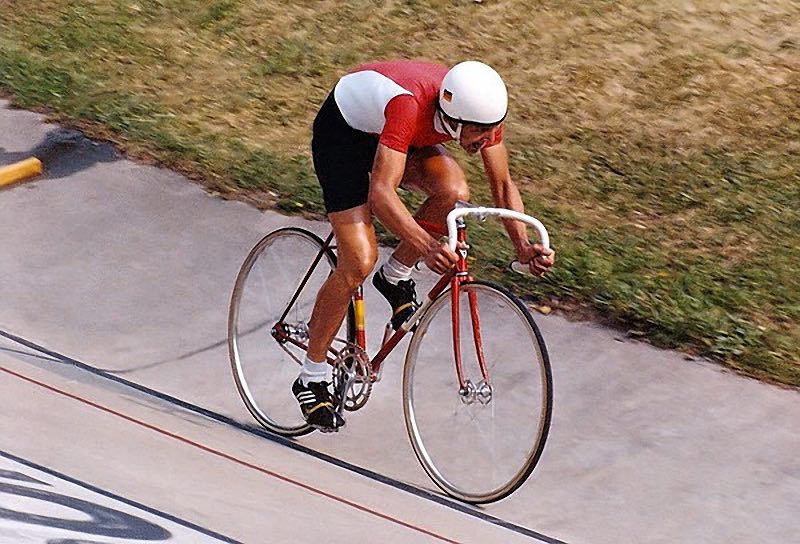
The Los Angeles Olympics in 1984, silver again behind Steve Hegg of the USA, it must have been a disappointment when it was revealed that the US track team there was ‘blood doped?’
“A little bit, there were no East Germans or Russians in LA and I was the favourite in the pursuit but then this guy who we’d never heard of before gets up and does this very impressive time in qualifying.
“When we saw how fast he had gone we knew I couldn’t beat him.”
You turned pro with Del Tongo in 1985 and right away won the Ruta del Sol; a brilliant debut.
“Udo Hempel, the former Olympic Team Pursuit Champion was chief of the Bremen Six Day and wanted me to ride there, I wanted to be in good shape for it so trained hard through the winter and carried that form through into the Ruta.”
I heard that Guiseppe Saronni, the team leader at Del Tongo became a little jealous of your successes?
“Not jealous, in 1985 there were no problems but I was young and enthusiastic and he was coming to the end of his career and he wasn’t training so much.
“We were working for him but he wasn’t getting the successes any more so I didn’t work so hard for him because I knew he wasn’t going to get the result.
“Because of this he kept me out of the Giro team for 1986 – I changed teams for 1987 to Superconfex.”
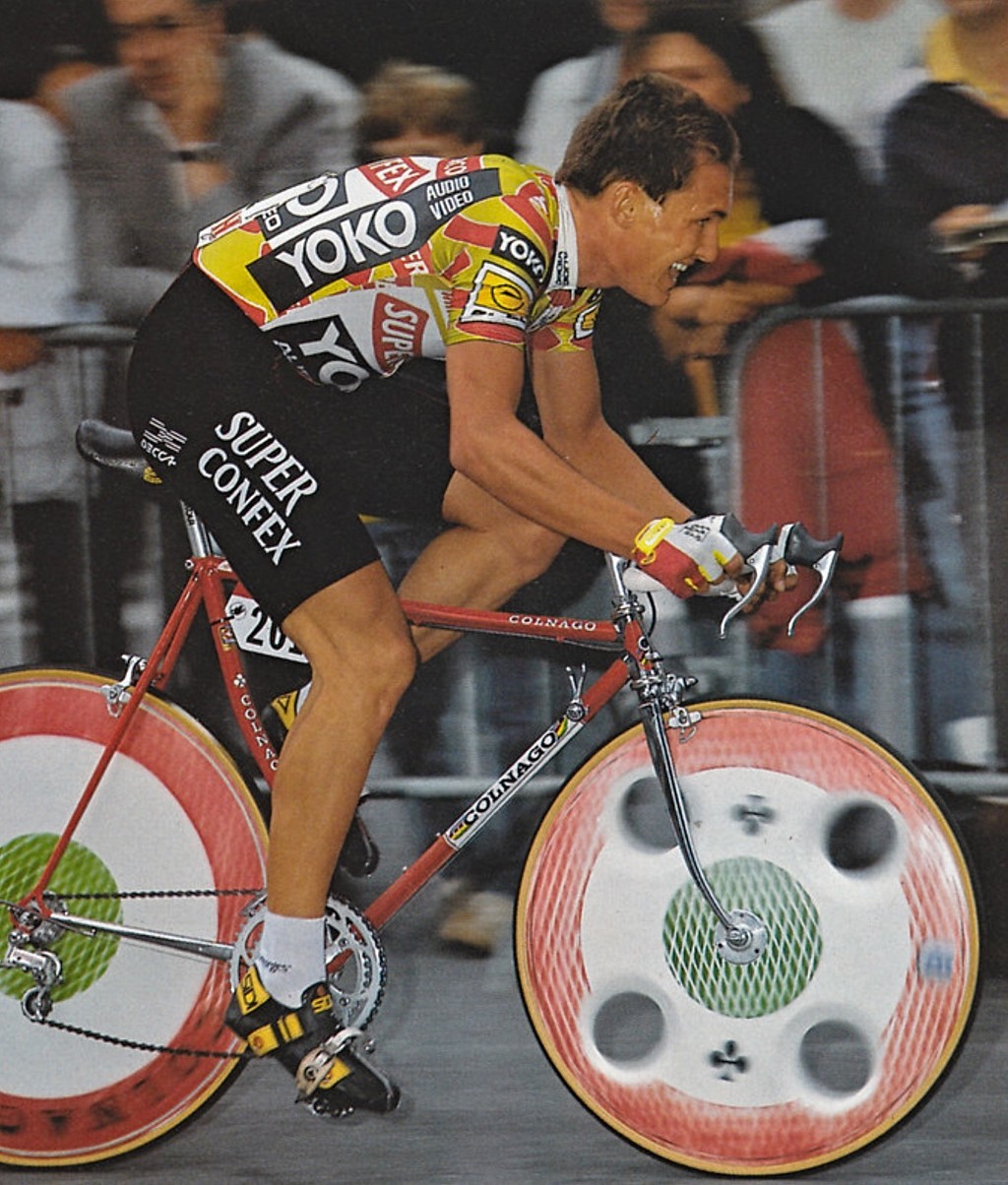
I believe you were close to the Polish guys who rode for Del Tongo?
“Czeslaw Lang and Lech Piasecki lived in the same building where I had an apartment, beside Lake Garda and I used to train with them.
“They were good guys and we became friends but my mentor on the team were Rudy Pevenage, who took me under his wing and Frankie Hoste was good with me to, so was Dirk Wayenberg.”
You won the ’85 German Professional Road Race Championship as a first year pro, beating Gregor Braun – he was a big name.
“Yes but he wasn’t in such good shape by that stage of his career – and I was fast in the sprint…”
And the late season Firenze-Pistoia time trial.
“With my pursuiting background I wasn’t a bad time trial rider and that course suited me, very flat and so very, very fast.”
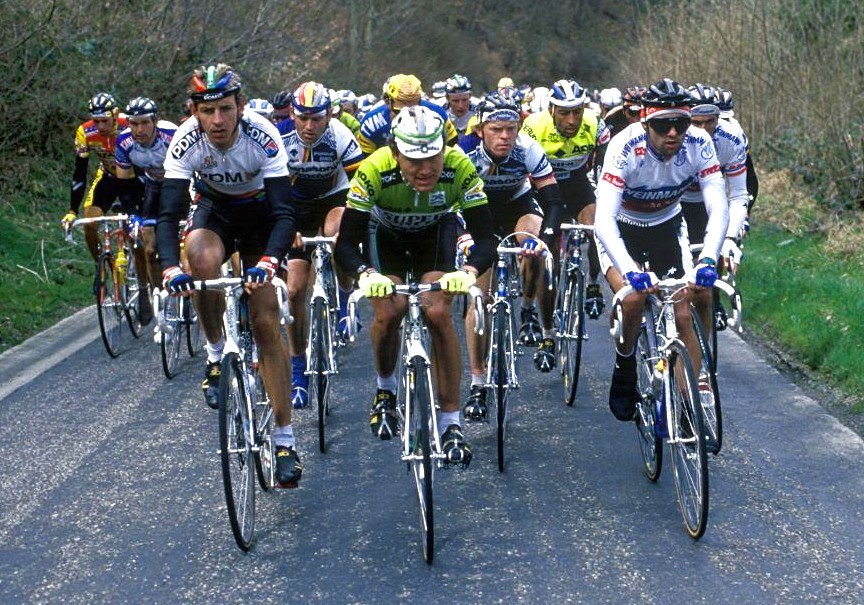
The 1987 season, Superconfex; you were with Jan Raas for four seasons, tell us about it.
“Yes, that was the best time of my career, the team was very ‘open;’ we had big stars like Van Hooydonck, Nijdam and Van Poppel but you were still allowed your freedom if you were going well.
“We had great success in the Classics and took a lot of stage wins.
“Raas was more on the management side, the man who was my DS and who I enjoyed working with was Hillaire Van Der Schueren; he was the man in the team car at a lot of my races.”
[Van Der Schueren is still ‘in the car’ now with those hard racing guys at Wanty, ed.]
The 1987 World Road Race Championship and you were fourth, a disappointment?
“Yes!
“We were coming in to the finish in a small group and I was watching Teun Van Vliet because he was fast in the sprint; but as I was watching him, Stephen Roche attacked, starting the sprint early, I thought about reacting but didn’t.
“I should have jumped on to him but didn’t, a moment of hesitation, a bad decision, I waited too long and the group behind came up.
“If I’d gone with him then I may have been passed before the line but I’m sure I would have been on the podium.”
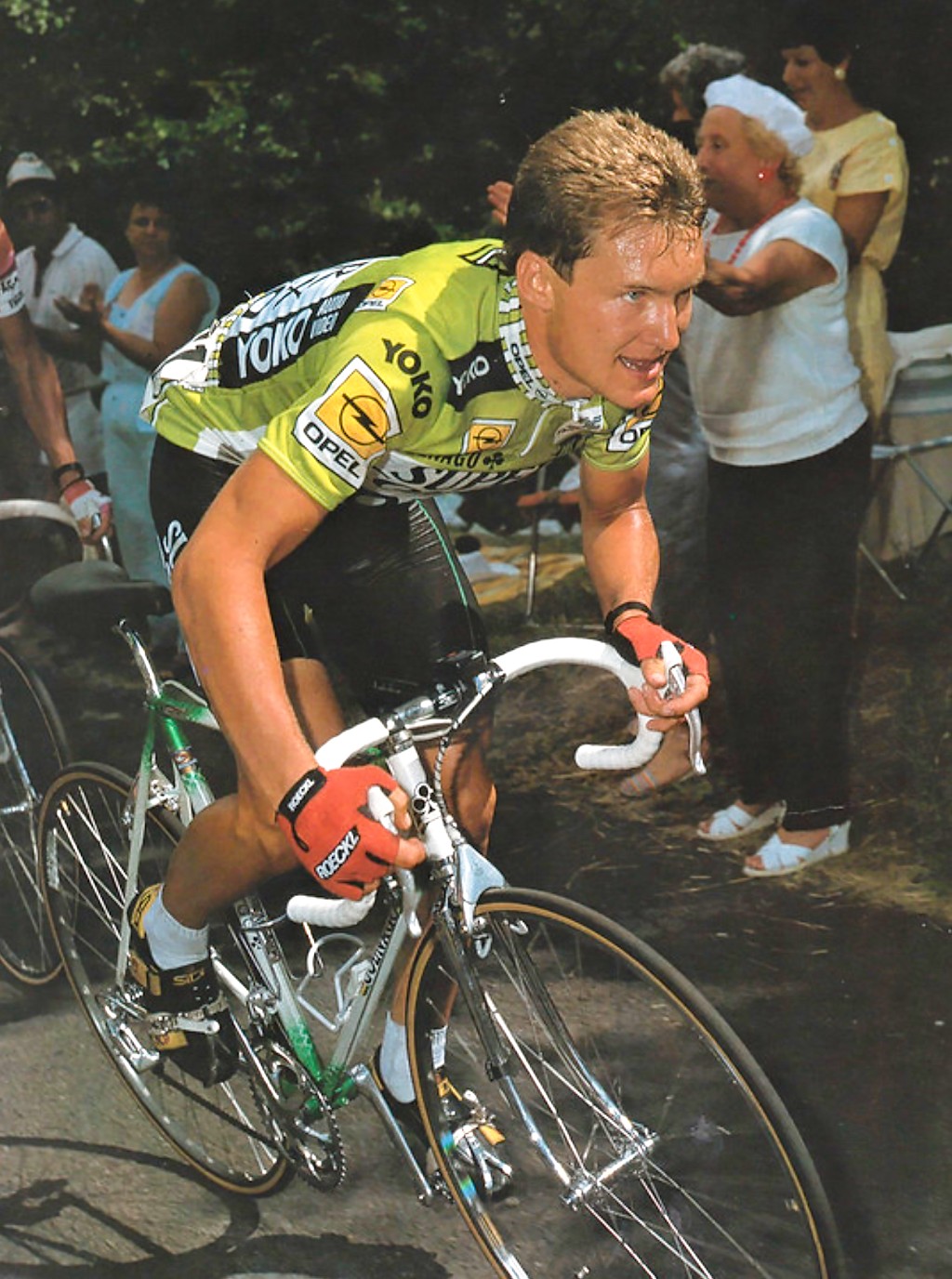
The 1988 season was huge for you – Tour of Ireland, Tour of Asturias, Paris-Brussels, Milan-Turin, Piemonte… why?
“Yes, I won many races that year, it’s hard to say why, I was in very good condition and began to win early; I wasn’t so great in the summer because I didn’t like the heat but come the late summer and autumn I was winning again.
“I always raced best when the weight of expectation wasn’t placed upon me – there was a good ‘flow’ that year, I just went well from one race to the next.”
And Flèche-Wallonne, not many pursuit specialists have won there…
“I wasn’t actually a track rider originally, I was a road man before that as an amateur; I was a member of the team which won the German 100 kilometre TTT for instance.
“I won the national pursuit championships but it was at a time when we didn’t have so many good pursuit riders in Germany so they developed me along that route.
“I had always gone well in the Fleche, I think I was 15th then eighth then third in the years before.
“I was in a little group with the likes Argentin and Rooks (eventual second and third, ed.), they were all watching each other and I chose my moment well, attacking about 10/15 kilometres before the finish.
“I was worried that I would crack on the Mur de Huy but I managed to hold on.”
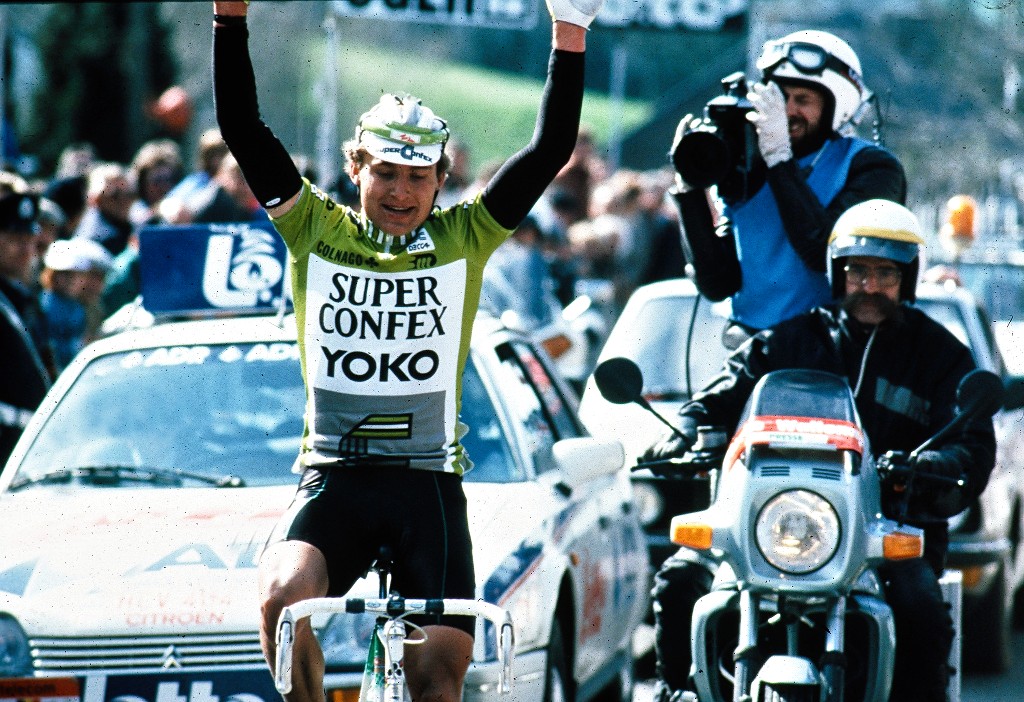
Tell us about your Tour de France stage wins.
“Those wins are very good memories…
“My first one was at Blagnac in 1987, there had been a lot of attacks but Ludo Peeters told me to wait and I chose my moment.
“I did and I was pretty fast in the sprint.
“The second one was at Nancy in 1988, we had Jelle Nijdam in yellow so I didn’t have to work – I beat Etienne De Wilde to win, coming off his wheel.
“I didn’t enjoy fighting for position but if I was in the right place I was pretty fast in the sprint.
“I liked the smaller stage races in Spain which were up and down all day, my strength was that I could get over the hills the pure sprinters couldn’t.
“And I could handle the Ardennes climbs too.”
You won the Baracchi Trophy with Tom Cordes in 1990, a highly prestigious race at the time.
“I had ridden it before with Lang in 1987 when we were third and had suffered badly but in 1990 I had ridden the Tour of the European Community and came out of it in good shape.
“Tom and I worked well together, when one was having a bad patch, the other worked more – we were a perfect team.
“There was no expectation on us, Raas told us just to go out and ride our race – it was a great experience.”
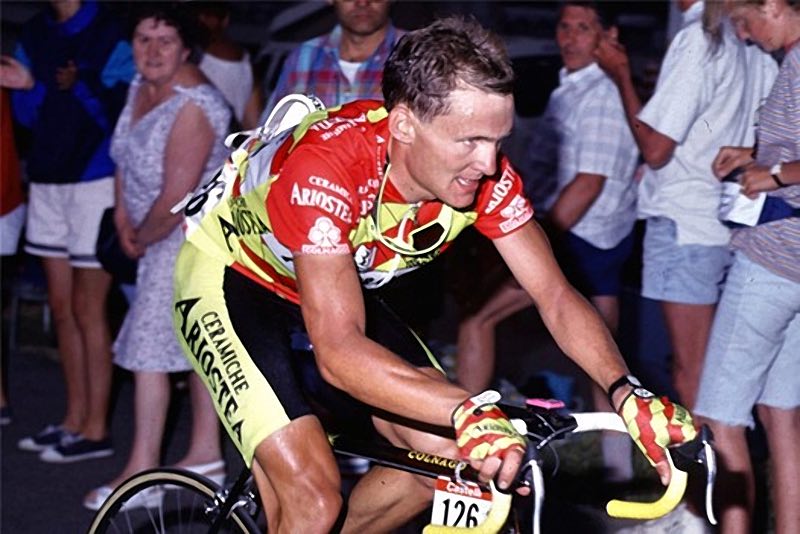
In 1991 you joined Ariostea the team of Giancarlo Ferretti, ‘the iron sergeant.’
“He was a hard director, he always pushed you; I didn’t ride well under big expectation; it was a bad decision by me to join the team.
“If you’re condition isn’t the best, often it’s best to recuperate then build up your training again – Ferretti just made you race more.
“And I was never good in the heat, he’d have me in races where it was 35 degrees – my motivation just went down and down until eventually I quit.
“I had another year to run on my contract but just said; ‘no.’
“Hillaire Van Der Schueren understood me much better, he’d have seen that I needed to do less and build back up, not do more.”
Which performances give you most satisfaction when you look back?
“The Tour stages for sure; winning the Championship of Zurich in 1987, that was a big World Cup Race back then; the Fleche of course and when I was second to Bugno in Milan-Sanremo, I was just 50 metres behind him but couldn’t quite close the gap.” [Bugno won by four seconds, ed.]
I’m surprised you didn’t ride many Six Days…
“I didn’t like the six days, I preferred to recover in the winter than build up my kilometres training on the road.
“I didn’t mind Grenoble and Munich which came after the road season but I certainly didn’t want to ride Six Days in January.”
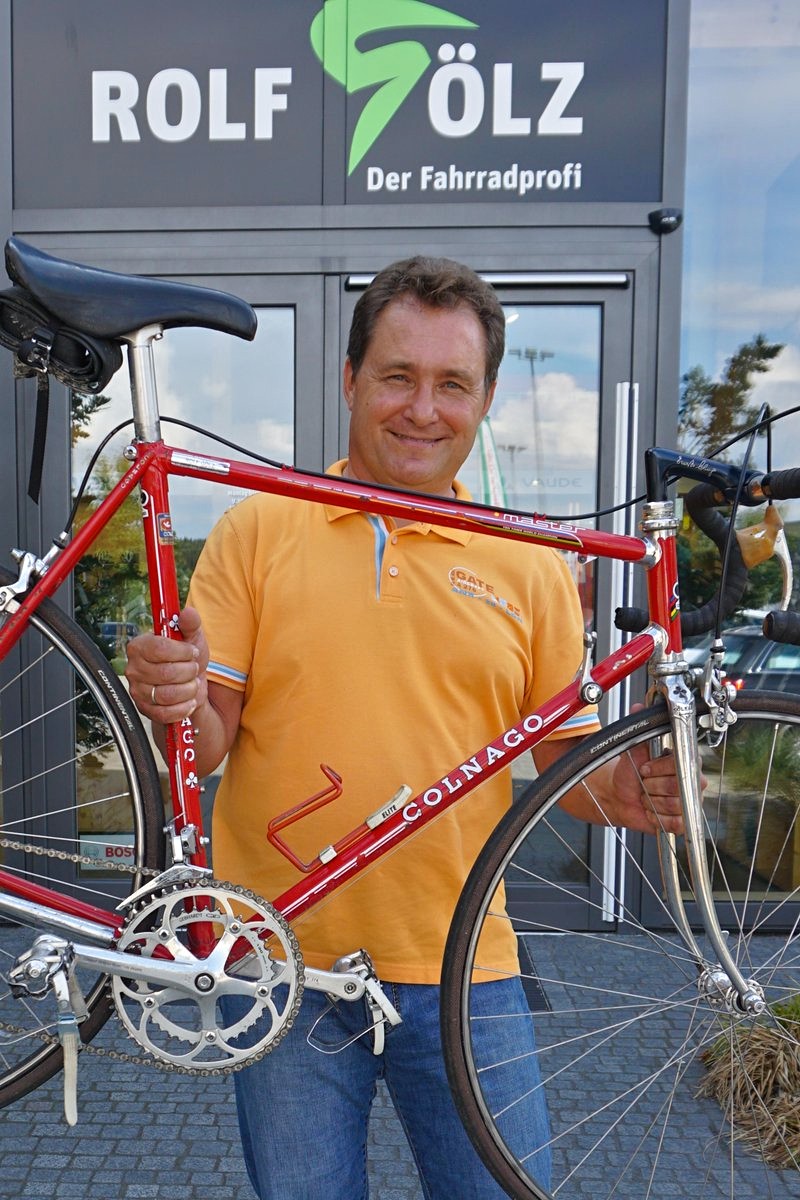
Regrets?
“I stopped too early, I still had the talent but my head wasn’t good; my morale was low – I wish had been harder with myself!”
And what do you do now?
“I have a big bike shop in my home town; we sell race bikes but the electric bike market is proving very good for us.”
With thanks to Rolf for his time and memories; ‘Turbo’ – just the best nickname.



